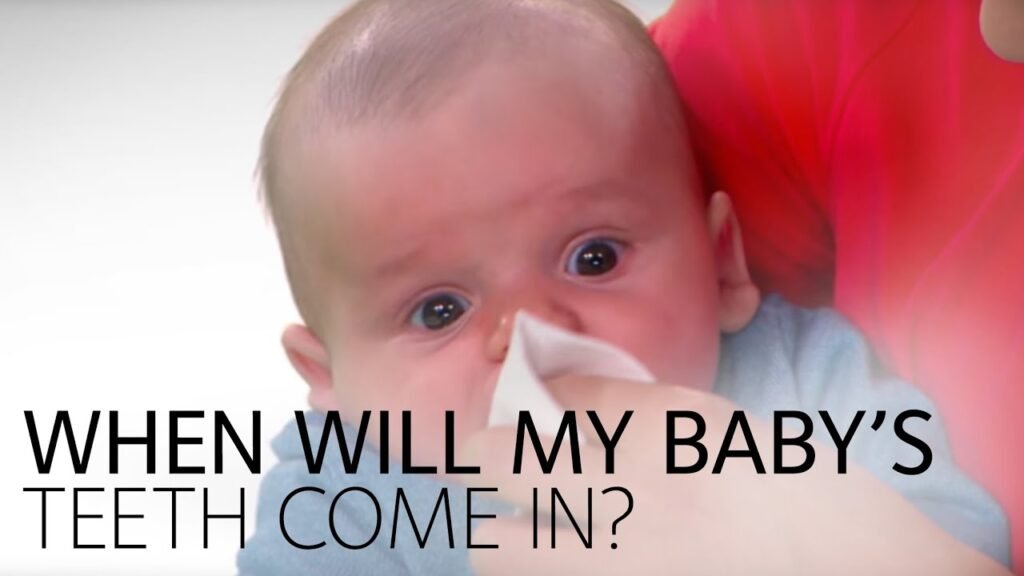Baby Teeth: When Do They Emerge?

Are you eagerly awaiting the moment when your baby's first tooth makes its appearance? The timeline for when baby teeth start coming in can vary, but most infants will start teething around 6 months old. Watching your little one's gummy smile transform as their teeth begin to emerge is a milestone that many parents eagerly anticipate. Read on to learn more about the teething process and what you can expect as your baby's pearly whites start to show.
When do baby teeth typically start to come out?
Baby teeth, also known as primary teeth, typically start to emerge between the ages of 6 and 12 months. However, it's not uncommon for a baby's first tooth to make an appearance as early as 3 or 4 months. On the other hand, some babies may not start teething until they are around 14 months old. Every child is different, so the timing of teething can vary.
While the average age for teething falls within the 6 to 12-month range, there is a wide spectrum of when baby teeth can come out. Some babies may begin teething earlier, while others may start a bit later. It's important to remember that every child develops at their own pace, so it's completely normal for a baby to fall slightly outside of the typical teething age range.
If your baby's first tooth hasn't made an appearance by 14 months, there's no need to worry. Just like with other developmental milestones, teething can vary greatly from one child to another. However, if you have concerns about your baby's teething progress or if you notice any unusual symptoms, it's always best to consult with a pediatrician or dentist for guidance and reassurance.
How many teeth should a 1 year old have?
Parents often wonder how many teeth their one-year-old should have. Typically, most children will have between two to four teeth at this age. However, it's important to keep in mind that every child is unique and may develop at their own pace.
By the time a child reaches around two and a half years old, they will likely have all 20 of their baby teeth. This process of teething can vary for each child, with some experiencing discomfort and others barely noticing. Keeping up with regular dental check-ups and maintaining good oral hygiene is crucial for their overall dental health.
If you have concerns about your child's teeth development, don't hesitate to consult with a pediatric dentist. They can provide guidance on proper care and address any issues that may arise during this important stage of your child's dental growth. Remember, every child is different, and it's important to be patient and supportive throughout their teething journey.
What is the appearance of teething poop?
During the teething process, it is common for a baby's poop to become looser and more watery than usual. The stools may also be slightly discolored and have a stronger odor. Parents may notice an increase in frequency of bowel movements as well. It is important to monitor the baby's hydration levels and consult a pediatrician if there are any concerns about the consistency or color of the stool.
Tiny Treasures: A Guide to Baby Tooth Development
Welcome to "Tiny Treasures: A Guide to Baby Tooth Development"! From those first adorable gummy smiles to the emergence of their first pearly white, this guide is here to help you navigate the exciting journey of your baby's tooth development. Learn about the stages of teething, tips for soothing discomfort, and how to care for those precious little teeth as they grow.
Understanding the importance of baby tooth development is crucial for ensuring your little one's overall oral health. As their teeth begin to come in, it's essential to establish good oral hygiene habits early on. This guide will provide you with the knowledge and tools to help your baby's teeth stay healthy and strong, setting them up for a lifetime of beautiful smiles. So sit back, relax, and let "Tiny Treasures" be your go-to resource for all things baby tooth development.
Growing Smiles: Understanding the Timeline of Baby Teeth
As parents, it's important to understand the timeline of baby teeth to ensure the healthy development of our children's smiles. Baby teeth, also known as primary teeth, typically begin to emerge around 6 months of age and continue to come in until around age 3. This process can vary from child to child, but by age 6, most children will have a full set of 20 primary teeth.
It's crucial to take care of baby teeth from the moment they start to emerge. Regular brushing with a small amount of fluoride toothpaste and routine dental check-ups are essential for maintaining healthy teeth and gums. As baby teeth fall out and permanent teeth begin to come in, it's important to continue good oral hygiene habits to prevent cavities and other dental issues.
Understanding the timeline of baby teeth can help parents support their children's oral health and overall well-being. By staying informed about when to expect teeth to come in and fall out, parents can better prepare for dental milestones and address any concerns with their child's dentist. With proper care and attention, we can help our children grow healthy, happy smiles that will last a lifetime.
As parents eagerly anticipate the arrival of their baby's first tooth, it is important to remember that every child develops at their own pace. While the average age for a baby's first tooth to emerge is around 6 months, some may start teething earlier or later. Keeping a close eye on your little one's oral health and offering comfort during this milestone can help make the teething process smoother for both baby and parent. Remember, just like every other stage of development, patience and care are key in ensuring a healthy and happy transition into the world of little teeth.